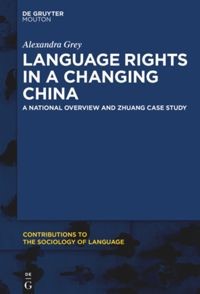A new book by Language, Culture and Justice Hub member Alexandra Grey has just been published (Contributions to the Sociology of Language #113, De Gruyter Mouton 2021).
Language Rights in a Changing China is the culmination of eight years of research, including fieldwork in four provinces across the People’s Republic of China. The book examines the constitutional minority language rights that China has had since the mid 20th century, and what they mean, both legally and socially, today. Over eleven chapters, this book offers an innovative combination of legal and sociolinguistic research methods, including ethnographic and linguistic landscape data, and a detailed case study of Zhuang, the language of China’s largest official minority group.
The case study traces minority language rights and policy from the Constitution to local government rules and practices, investigating how Zhuang language rights are experienced as opening or restricting socioeconomic opportunity. It compares Zhuang language rights to the language rights relating to the national language, which have been enshrined in legislation since 2000. Amongst other findings, the study finds that language rights do not empower Zhuang speakers, nor challenge ascendant marketised and mobility-focused language ideologies which ascribe low value to Zhuang. However, people still value a Zhuang identity validated by government policy and practice.

Part One sets China’s language rights and minority languages in a context of contemporary change and offers a profile of Zhuang language.
Part Two analyzes China’s legislation about language and formal decision-making framework within which this legislation operates. It identifies the competing ideologies within these laws and critiques the distribution of authority to govern Zhuang. Overall, Part Two argues that the language governance framework neither empowers Zhuang speakers nor the institutions tasked with governing Zhuang, despite the existence of a nominally autonomous Zhuangzu region. Furthermore, the Zhuang language governance framework entrenches the normative position of a developmentalist ideology under which Zhuang is constructed as under-developed and of low value.
Part Two stands alone but also provides a foundation for Part Three’s empiric exploration of the Zhuang language governance framework in its situated practice and social reception.
Part Four sets out where Grey thinks 21st century Chinese minority language policy is headed, and in which respects she would like to alter its course. Finally, Grey engages in wider discussions of linguistic justice and reflects on the study’s general implications for theory, methodology and policy-making in relation to minority/language rights.
This is a thought-provoking work on minority rights and language politics, relevant well beyond China.
Read the contents page and selected excerpts at Google Books. You (or your library) can order a hard copy or digital copy.
You can also download the Preface and Chapter Ten – Conclusions in Mandarin, for free. On that same webpage, you can read an overview of the book in Zhuang.
